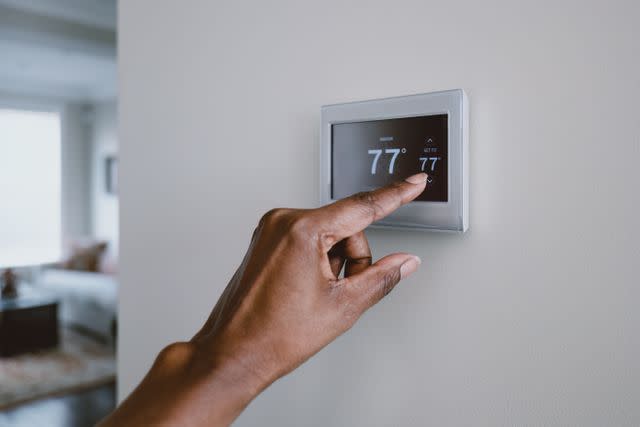What Temperature Should You Set Your Air Conditioner in the Summer?
Stay cool while also saving on your energy bills.
With record temperatures and soaring utility bills, it can be a challenge to keep cool this summer while keeping your energy bills in check. On sweltering days, you may feel tempted to lower your thermostat and crank your AC, but the result will be a high bill at the end of the month. It’s a tricky proposition, so some expert input can help provide a solution.
We’ve asked heating and cooling experts about the best temperature to set an AC in the summer so you can stay cool and keep a handle on expenses.

Grace Cary/Getty Images
Related: 6 Low-Cost Ways to Make Your Home Cooler—and Save on Your Electric Bill
What is the best temperature to set an AC in the summer?
According to the U.S. Department of Energy, 78 degrees Fahrenheit is the most cost-effective AC setting during the summer months, making it the ideal temperature for the daytime, says Angie Hicks, chief customer officer at Angi and co-founder of Angie’s List. “However, you should turn down your thermostat at night for optimal sleep and comfort,” she says.
That said, Hicks adds, your ideal summer temperature could be higher or lower depending on your personal preferences, your location and the type of AC unit you have.
Related: 10 Ways to Keep Cool When It's Too Hot to Sleep
What temperature should you set the AC when you aren't home?
The first consideration in determining the right temperature for your AC in the summer is whether or not you will be home. “If you are leaving your home for the day, you can set the thermostat to a higher temperature to save energy,” Hicks says. “I recommend setting your thermostat about five degrees higher than your go-to temperature when you leave your home.” You can keep this rule of thumb in mind when winter rolls around, too. “In the winter, you can set your thermostat five degrees lower for the same effect,” she adds.
If you will be home all day, you should set your thermostat to a comfortable temperature. “Most people choose a temperature in the 70s during the summer months, but it really depends on your personal preference,” Hicks explains. “Just keep in mind that your energy bills will increase if you choose a temperature that is drastically lower than the temperature outside.”
How does the temperature setting of your AC affect your energy use and bills?
Your HVAC system uses energy to heat and cool the air inside of your home. “When it’s hot outside, the system needs to use more energy to cool down your home, which leads to higher energy bills,” explains Hoelter. The opposite is true in the winter months, and your energy bills will increase as you set your thermostat to higher temperatures, she says.
Central air vs. window and portable units
The recommended temperature settings for air conditioners are easiest to apply to central air systems, where you have the most control and reliability. However, if you're using central air, says Hicks, it’s helpful to keep note of the location of the thermostat as there will always be differences between rooms. “If needed, look for a remote sensor to be able to control the temperature based on individual rooms being used,” she suggests.
Finding the right temperature can be a little more complicated if you use window units rather than whole-home HVAC systems, according to Austyn Hoelter, merchant at The Home Depot. “Window AC units are only able to cool small spaces, so you may need to use multiple units to cool your entire home,” says Hoelter. “You also might need to use trial and error to find the right temperature using a window unit.” Not all window and portable AC units come with a built-in thermostat, so it may take some time to determine the right settings—and you may need to remember to turn the unit on and off to avoid using too much energy.
However, no matter what type of AC you have, it helps to combine your cooling system with other actions to reduce heat in your home—like closing the curtains and using fans to circulate air.
For more Real Simple news, make sure to sign up for our newsletter!
Read the original article on Real Simple.

